There are many craft markets that dot different parts of Ghana and that includes the city of Accra. Throughout my six weeks in Ghana, I’ve visited many different craft markets – some small, others large – each offering a variety of items being sold and showcasing the unique personalities of the vendors who sell them.
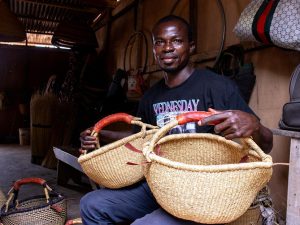
Craft markets in Ghana play an important role in supporting local economics, as well as platforming artists to showcase and sell handmade goods. As you walk through craft markets, you may see stacks of kente cloth being sold by the yard, racks of dangling beads draped along wooden walls that make up the stalls of vendors stores, and carvings that represent different stories from across Africa.
The main craft market I have been exploring throughout my time in Ghana is the Accra Arts Centre Craft Market, which is located near the Law Courts Complex.
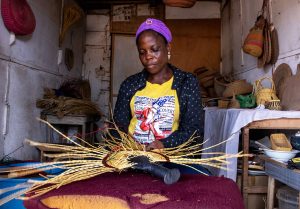
“Art is learning,” says Anaoo Million, an artisan in the craft market. He makes drums, paintings, and carvings, while also selling them in his store. Anaoo has been in Accra working in the market for the past 11 years.
“He is originally from the Northern part of Ghana, and while he does make items such as drums, he also teaches people how to play them as well. Anaoo explains how in the North, most people farm, and he’d come to Accra to pursue something different.
“The fact is that sometimes you can never choose for yourself. Your creation will choose for you,” says Anaoo. Throughout my conversation with Anaoo, it was clear that he believes that art and creation is vital, he says “life is full of art.” Anaoo did explain, however, that many people don’t choose this path of artistry.
As I walked through bustling markets and craft markets, I was always curious about people’s backgrounds. Were they from Accra? Or had come from another place to pursue something different, much like Anaoo.
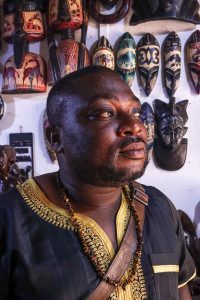
“This is what they do to survive, you know,” said Anaoo to me, as we looked outward at other carvers and craftsmen in the market, “they do it for a living, and they do it to take care of their families.”
As I continued to speak to people and hear a little bit about their personal history, and what they do in this market, it became clear that many of them had been doing their craft since they were little, and it had been passed down to them. I found, after talking to people about their upbringing, that most started their craft out of necessity, not necessarily passion. It was a necessity to learn how to carve or weave, because that’s how they were able to provide for their family.
I had the opportunity to speak with Victoria Atampujre, a basket weaver also from the Northern part of Ghana. Victoria has been in the Accra Arts Centre Craft Market for approximately 20 years. She produces woven baskets and other vendors buy them from her and sell them to locals and tourists in the market.
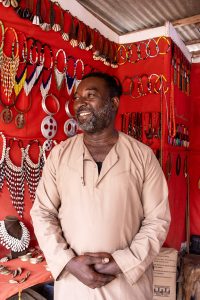
I was able to speak with her, but as I’ve learned throughout my time in Ghana, I have a very thick American accent on my English. We had someone translate while we spoke and I learned that basket weaving to Victoria was simply something she’s always done. She was taught as a child and weaving is a way of providing for her family.
After chatting with Victoria, I spoke to two other basket weavers in the market, Adongo Jerry and Faustina Bukara. “It is something we learn from our forefathers,” said Andongo Jerry. Weaving was something he also learned when he was small, but he now focuses on buying and selling baskets.
Both Victoria and Faustina were weaving while I spoke with them. It was clear that the skill to weave was something they were well honed in, something that they had indeed been doing since they were young.
Their hands moved faster than my eyes could track, and at one point, while speaking with Faustina, she yelled out to someone outside of the shop we sat in, and I watched in awe as her hands didn’t waver, continuing an intricate pattern despite to be seemingly not paying attention to her weaving.
“This business was my father’s business,” said Ahmad Mohammad. Ahmad has been in the market for over 30 years, and was born and raised in Accra. “I sell everything to support my family,” said Ahmad.
In his store, he deals in gemstones, leather bags, traditional necklaces, and wooden carvings. Soon after Ahmad finished up with his schooling, he came to the store to help his father with the business, which is now his business. Now, with years of experience in the Accra Arts Centre Craft Market, Ahmad continues his business, along with his father’s legacy.
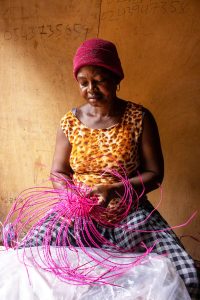
I continued to speak with many different vendors, including other carvers and a bronze sculptor. I learned how in craft markets, there may be beautiful artwork for sale, but the market is more than just a place for commerce. It’s a space for artistry, tradition, and survival. Many and most of the artists and vendors I spoke to weren’t simply selling goods, they were preserving tradition, continuing family legacies, and doing their best to make ends meet for their families.
Whether it was Anaoo teaching someone how to play the drums, Victoria and Faustina weaving baskets with practiced ease, or Ahmad carrying on his father’s trade, each person showed that their craft ran deeper than simply business.
History was deeply rooted in their work, which was something I felt, but hadn’t understood the first time I’d entered a craft market in Ghana.
My time in this country is slowly drawing to a close, I’ll keep the experience and value the stories I’ve learned throughout my time as I walked through craft markets. By speaking to different artists and vendors, I understand that these markets are not only vital to Ghana’s economy, but to its cultural history. The Accra Arts Centre Craft Market, and craft markets like it, have shown that they are living archives of the craft and resilience of Ghana.
By Anna Liv Myklebust









